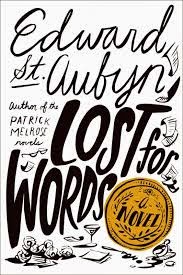Today's Sunday Guardian column.
We
need more satires and parodies. Everyone nowadays is far too ponderous,
thin-skinned, ready to take offence: such attitudes should be skewered. When it
comes to novels and novelists, too, talk is largely of the Purpose of Art, the
Bold New Direction and the End of Reading, accompanied by knitted brows and
weighty self-expression. The Swifts and the Waughs are
consigned to the past. Into this breach steps Edward St Aubyn with his new
novel, Lost for Words. This isn’t a bittersweet,
semi-autobiographical saga, as with his Patrick Melrose novels, but a sharp send-up
of contemporary writing and writing prizes. When it was awarded the Bollinger
Everyman Wodehouse Prize for Comic Fiction last week, the news was greeted with
the inevitable headline: “Novel mocking literary prizes wins literary prize.”
It’s
not that the subject hasn’t been handled in fiction before: just last year,
there was Howard Jacobson’s Zoo Time,
a rant on the state of publishing and the bestseller list, as well as Filippo
Bologna’s sardonic The Parrots, dealing
with three writers vying and conniving for a prestigious literary award. Now, St
Aubyn’s Lost for Words comes as
another reminder that a prize can be a flawed yardstick with which to judge a
book. The one in question in this novel is the Elysian Prize, clearly modelled
on the Man Booker. (St Aubyn’s own Mother’s
Milk narrowly failed to win in 2006, losing to Kiran Desai’s The Inheritance of Loss.) The group
behind this fictional prize, dealing in genetically modified crops, is keen on
a good public image; earlier, they had to face “some regrettable suicides among
Indian farmers, whose crops had failed when they were sold Cod wheat, designed
to withstand the icy rigours of Canada and Norway rather than the glowing anvil
of the Indian Plain”.
Lost for Word’s
chapters alternate between various authors, publishers and agents hoping for a
favourable outcome on the night of the awards, as well as the judges and the
pressures on them. One among the latter group is Penny Feathers, formerly of
the Foreign Office and writer of breathless thrillers -- any resemblance to
Stella Rimington, erstwhile Director General of MI5, writer of novels featuring
female intelligence officers and chair of the judges for the 2011 Man Booker
Prize, is not entirely coincidental.
There’s
also the lordly Sonny, six hundred and fifty-third maharaja of the former
Indian princely state of Badanpur, who hopes to win with his huge novel, The Mulberry Elephant. However, it’s not
this book but his aunt’s palace cookbook, entered by mistake, which makes the
shortlist (“fiction artfully disguised as culinary fact”) and this causes Sonny
and others much heartburn. As this and other such incidents show, St Aubyn’s
novel is rich in farce. His barbs are pointed and aimed at the pretentiousness
of the establishment. One of the judges is all for “relevance”; another is interested
in “good writing”; yet another lauds a novel by asserting that “it creates a
participatory reality”.A Beckett-inspired novelist rues “art based on impact,
rather than process, structure or insight” and another enjoys reading
historical fiction because “one met so many famous people…like reading a very
old copy of Hello! Magazine”.
Throughout,
St Aubyn provides lengthy extracts from the titles on the Elysian longlist,
adding to his novel’s pleasures. It can thus also be read as a handbook of pastiches,
most enjoyable of which are sections from an Irvine Walsh-influenced work, “a
harsh but ultimately uplifting account of life on a Glasgow housing estate”,
entitled wot u starin at: “ ‘I told
yuz nivirivir to talk to uz when aymtrackin a vein,’ snarled Death Boy.”
Clearly,
St Aubyn has had great fun in writing Lost
for Words, which shows even in the names of agents and publishing houses
(John Elton; Page and Turner). More mischievous than mean-spirited, it should
be read with the same roguish spirit it displays when bayonetting its targets.

1 comment:
We enjoyed reading your clever review of the book. Inge Jawahir
Post a Comment